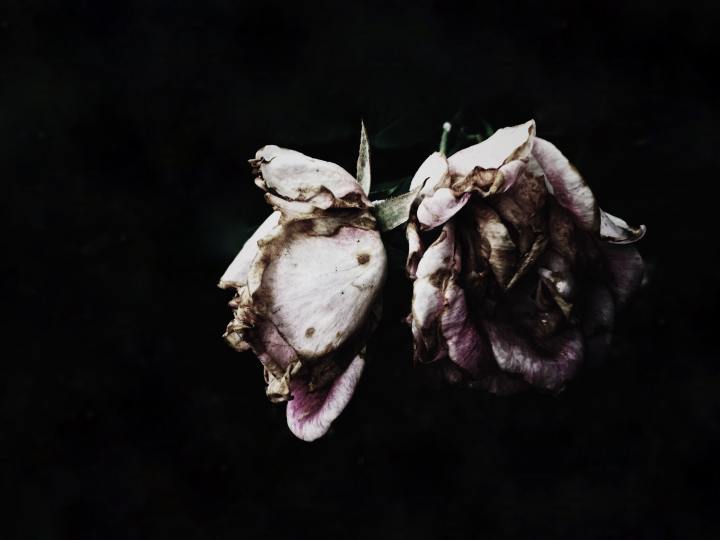REFLECTION
On appreciating what we have built, even as we stand in its ruins

Heartbreak is the very essence of being human, of being on a journey from here to there, and of coming to care deeply for what we find along the way.
My first experience of heartbreak was when my parents got divorced when I was 13 years old. The loss of a family unit that shifted and changed shape affected me in a deep and unprecedented way.
At 16, I experienced a different kind of heartbreak when my first boyfriend dumped me for another girl without telling me. I remember the shock of the discovery. The bell had rung, signalling the end of the school day; laughing at something a friend had said, I exited the school gates. That was when I saw him casually leaning against a wall, on the other side of the road. Surprised, I picked up my pace, elated to see him. My heart skipping a beat, I was walking towards him, when, suddenly, another girl from my school approached and leaned in to kiss him. I remember standing there, my feet on solid ground, my mind soaring up and out of me. I watched as he took her hand. She slung her school bag over her shoulder, leaned into him and, together, they walked away — a mirage disappearing into the distance.
I spent countless nights watching the time tick by, trying to understand the raging inferno of hurt and betrayal. What had I done wrong? Why was I not good enough? What did she have that I did not? And most importantly, how was I to live with the unbearable pain of rejection and unrequited love? I had no terms of reference for being able to see that the inexplicable soreness consuming all my consciousness was a transient, fluid thing — that with time, it would evaporate, its particles settling.
In that moment, all I saw was the intensity of the pain, the ways in which it weighed me down — the drudgery of having to put one foot in front of the other, getting on with the business of life when all I wanted to do was fall down and disappear.
As it is with heartache, my heart healed, life got better, and I laughed and loved again. Until, of course, the next heartache knocked on my door. More relationship losses. Divorce. The death of my mother. The loss of a long, treasured friendship that had run its course. The death of my father. With each new experience, the intensity and the all-consuming nature of the emotional roller coaster did not change. What did change is the ways in which I have begun to think about heartbreak.
The loss of a loved one is something that we mostly do not have control over — it entails letting go of those whom we hold dear, those with whom we have history. It is an acceptance of holding all the memories of time spent together, knowing that it is not possible to create any new stories to fill our memory banks. Relinquishing this control — bowing down before it is a step in the direction of transforming heartbreak from something we lose into what we gain — how the rupture of its nuance changes us, makes us different, and able to sit in the journey of life with its inevitable relinquishing of loved ones.
David Whyte in Consolations (2020) argues that our hope of escaping heartache in adulthood is beautifully and ironically childlike, that heartache is as inescapable and inevitable as breathing. It demands its due and is hidden in the DNA of our relationship with life. It can also ground us in whatever grief we are experiencing, planting a seed with what we have left or appreciating what we have built even as we stand in its ruins.
Whyte reminds us that heartbreak asks us not to look for an alternative path because there is no alternative path. It is an introduction to what we love and have loved — it is the inescapable and often beautiful question of something or someone asking us to be ready to let go of the way we are holding things and preparing for the last letting go of all.
Whyte argues that our hope has been to want to place our feet where the elemental forces of life will keep us from the losses that all other human beings have experienced since the beginning of conscious time. Yet, heartbreak is the very essence of being human, of being on a journey from here to there, and of coming to care deeply for what we find along the way.
Some losses mark us more than others — we live constantly on the edge of their mark, their pain is residual, a wound we’ve adapted to living with. With psychic numbing, we can adopt a survival strategy of disassociation. Yet, scratching beneath this surface, the hurt can roll like a fire in the woods. While heartache causes a rupture — one that we can use to grow and learn from, the memory of some losses is like stepping into the shifting sands of a chasm, pulling us into its abyss.
But here’s the thing — we cannot control heartbreak.
What we do have control over is this — the story we tell ourselves of our suffering, the ways in which we draw connections between the dots in the story of our pain, and the way that we use the narrative art of using heartbreak to step into a new story that is yet undiscovered and wide open with possibility. DM/ ML
In case you missed it, also read Why it’s good to get lost when a relationship ends

















 Become an Insider
Become an Insider
Comments - Please login in order to comment.